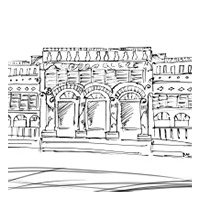Her family Kalipuja at the Chowdhury zamindar bari (house) is something to remember for our member, Ms D. Dutta
Shingti Shibpur, a small town in Howrah district, was a land of many zamindars (landed gentry) in Bengal during the British era. Born in the Chowdhury family, our member, Ms D. Dutta, had a luxurious and happy childhood in the joint family of the zamindar, with her 21 cousins and siblings. The children never understood the difference between cousins and siblings. There was one maid who looked after the children; the dal (lentil) and rice would be mixed on a big thali and the mashed potato kept on the side, as all the children were fed one by one. “After the first child had its share, the next would sit with the mouth wide open. I remember the fun of such shared meals. The milkman would comment that the children would all be fair as they had boiled potato and milk every day!!”
It is the memory of the Kalipujo, celebrated with traditional pomp every year, over the generations, which make for her most cherished memory. It was an open house and people from nearby villages poured in for the bhog (devotional offering of food, shared with the worshippers) at the zamindar bari. In the days of yore, 150 buffalos would be sacrificed in front of Ma Kali but the practice was abandoned following an accident. Sacrificial lambs were brought in thereafter. Over the years, the number has decreased to 25 but the sacrifice continues.
Only special priests could perform the puja; the “Agambagish”, who travelled from Khanpur to Shingti Shibpur to perform the puja for the zamindar family every year. The ritual was to place the Noibeddo (oblation) on the tongue of the enormous idol. The puja was just for a day but the elaborate arrangements to prepare the bhog and the meat cooked especially by the “thakur” (brahmin cooks) are still afresh in her mind.
The idol was so big that the pre-immersion ritual of ladies applying vermillion on the forehead of the deity was possible only with the ladies climbing a ladder to reach the forehead. Then the entire village would join the procession for the immersion.
“Today, after a long time, I had boiled and mashed potato and rice and milk, in spite of being diabetic. I told my help maid about the meals that I had with my siblings and cousins in our childhood!” (As told to Support Elders by our member)
Want to share your experience? Please mail your story to writetous@supportelders.com with your name


